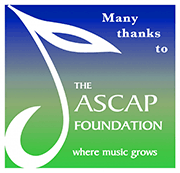Why Music Education Matters
 Harris Interactive Poll on music education – an independent survey of 2,565 adults across the United States:
Harris Interactive Poll on music education – an independent survey of 2,565 adults across the United States:
- 88% of participants with post graduate degrees participated in music education
- 7 of 10 adults say music has had some influence on their personal fulfillment
- 96% of school principals surveyed believed music education encourages students to stay in school
- 89% of school principals surveyed believed a high-quality music education program helps to their school achieving higher graduation rates
Public Attitude Towards Music study taken by NAMM (National Association of Music Merchants) of participating households across the United States:
- 97% of participants believe music education helps a child develop creativity
- 96% of participants believe playing a school band helps a child develop teamwork skills
- 94% of participants believe that music is part of a well-rounded education
- 92% of participant believe music should be offered as part of regular curriculums at schools
- 88% of participant believe that student participants in music often receive better grades
November 18, 2013 – Medscape: “More Evidence That Music Benefits the Brain” – “Intense musical training generates new processes within the brain, at different stages of life, and with a range of impacts on creativity, cognition, and learning,” said Dr. Schlaug.
December 8, 2012 – The Huffington Post: “The Power of Music” – “More neuroscientists, psychologists, educators and others are finding that the arts help nurture the right hemisphere of the brain, and is exactly what the more left brained curriculum needs to create the new thinking skills leading to creativity.”
We need music education! When economic realities hit school budgets, music programs are reduced or eliminated. In districts where there have been minimal cuts, schools have found alternate sources of funding such as grants and donations from corporate sponsors and charitable donors. Unfortunately, the need for funding for the arts significantly exceeds the supply of funds available. The Mark Wood Music Foundation provides the financial resources to keep music education in our schools and to inspire children to be better musicians and learners.
Crisis in Music Education
- “Already, an estimated 294,000 jobs in the education sector have been lost since 2008, including those in higher education.” – Huffington Post (Oct. 2011)
- “At least 30 states have had cuts made to their school music and arts programs at every level from K-12 to collegiate.” – Give A Note Foundation
- New York: “Funding for the arts in public schools was cut by 68% between 2006-2007. This equates to $7.2 million lost in funding for music programs.” – ABC News
- “The Los Angeles Board of Education approved a preliminary, worst-case $6 billion budget Tuesday, a plan that would eliminate thousands of jobs…and cut some after-school and arts programs.” – Los Angeles Times (March 2012)
- “Craig Manteuffel, director of bands in the Hays school district and a member of the Kansas Music Educators Advocacy Committee, cited a survey of Kansas districts that showed 124 music positions have been cut across the state this year, and 185 positions have been cut in the last three years.” – Kansas Education Policy Report
The problem: School districts have been forced to cut costs to deal with current financial situations. Budget costs have taken a toll on school district budgets for arts, especially music programs. But a student’s education would be lacking a fundamental piece if music is not a part of a curriculum.




